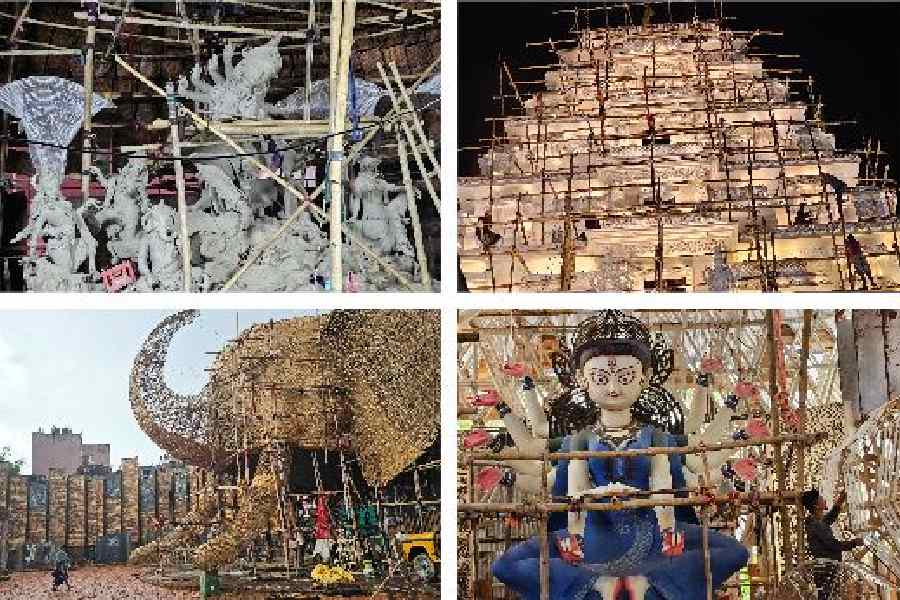Dum Dum Park area
Dum Dum Park Yubak Brinda
Year: 58th
Budget: Rs 18 lakh
Theme: Bhitemati
Theme-maker: Tapas Dutta
The look: Hand-stitched asanas are being showcased here. “It is the pull of home that brings the Mother Goddess back just as it does thousands of sons and daughters who stay away from family. The asana symbolizes one’s own family seat,” says the theme-maker Tapas Dutta. Weavers in Kalna, Burdwan, are making 96 asanas and bar-asanas, the latter being double seats meant for the bride and the groom to sit on their homecoming, using weaves with novel names like Bokulphul, Anaraser Chokh, etc. A tulsi mancha stands at the centre as a focal point of stability. The idol stands with just the trident in hand, as if guarding home. The demon king also has a homely look, sitting at a side, as does the lion.
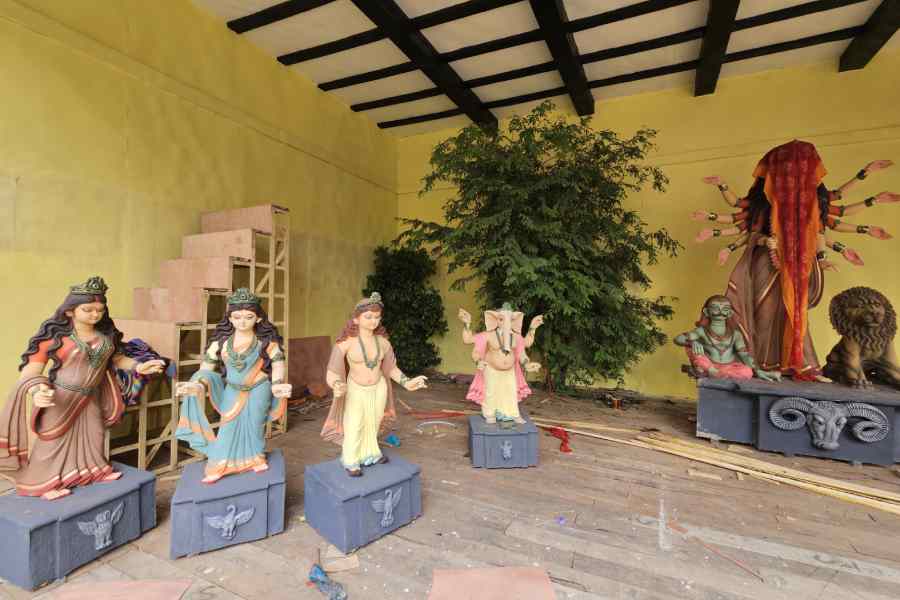
Dum Dum Park Yubak Brinda Sudeshna Banerjee
Dum Dum Park Tarun Sangha
Year: 39th
Budget: Rs 45 lakh
Theme: Muktodhara
Theme-maker: Anirban Das
The look: Man’s attempt to put a leash on nature through hydel power projects, often with disastrous effects, is in focus here. Anirban has used the waterbody next to the pandal to great effect extending the mountainscape he has created along the banks. “The hillsides are getting dotted with buildings. Barrages are impeding the flow of river water. Nature is bound to rebel,” says Anirban. The mountain sides have been created using a collage of cloth strips, which is evident at the bases at the visitors’ eye level, where large pieces of cloth have simply been stuck, giving an indication of the material used for the scenery at the upper levels. A rusty bridge connects adjacent hills while a sluice gate dam is visible at a height on the hillside. Water rushes downhill through it and gets collected in a canal below. Sixteen pipes, hidden from view, carry the water which is pumped out of a bigger sluice gate under the pandal approach and into the existing waterbody. Along the hillside, a performance will be held in a demarcated space to the song from Tagore’s play Muktodhara, Roilo bole rakhle kare hukum tomar cholbe na re. The goddess is like a sculpture inside a cave, in the aspect of Hara-Parbati. Water flows from Shiva’s locks unimpeded. Holograms of cosmic bodies make up her chalchitra. In front, performers dance to the song Akash bhora surja tara.
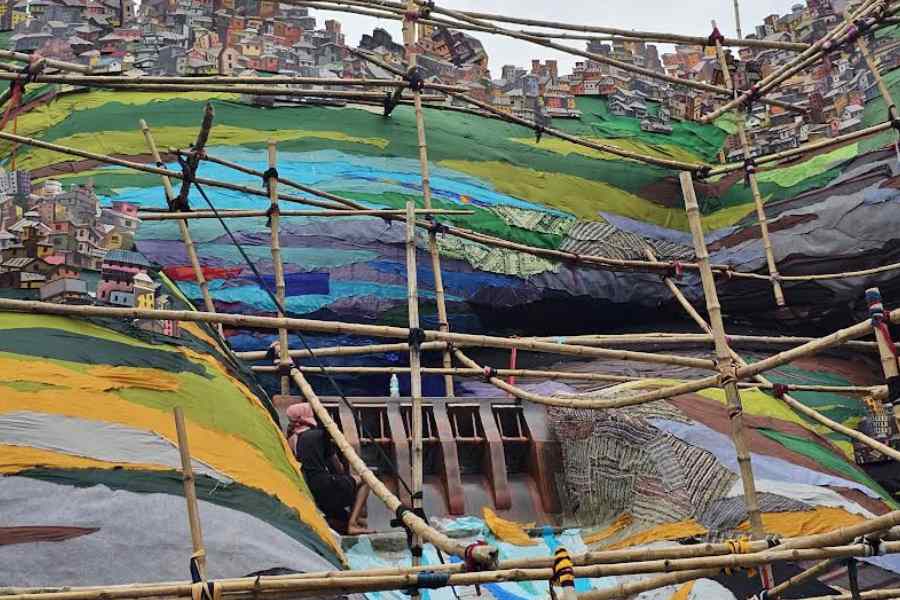
Dum Dum Park Tarun Sangha Sudeshna Banerjee
Dum Dum Park Bharat Chakra
Year: 24th
Budget: Rs 55 lakh
Theme: Udaan
Theme-maker: Aditi Chakraborty
The look: The pandal is a tribute to the jamdani weave. “People think of jamdani as only a sari. But it is an embroidery,” says Aditi. The visitor is welcomed by a vertical artistic representation of a spine, denoting the empowerment of jamdani weavers. The structure fans out both ways to denote wings, denoting the flight of their craft. Jamdani weave on 400m of net drapes the approach walls. Inside, a world map denoting places where jamdani is exported from India is put up behind the idol. On the opposite wall, linocut panels depict slices of life of Musthuli, the village in Burdwan, where 25 women have been weaving the material for months.
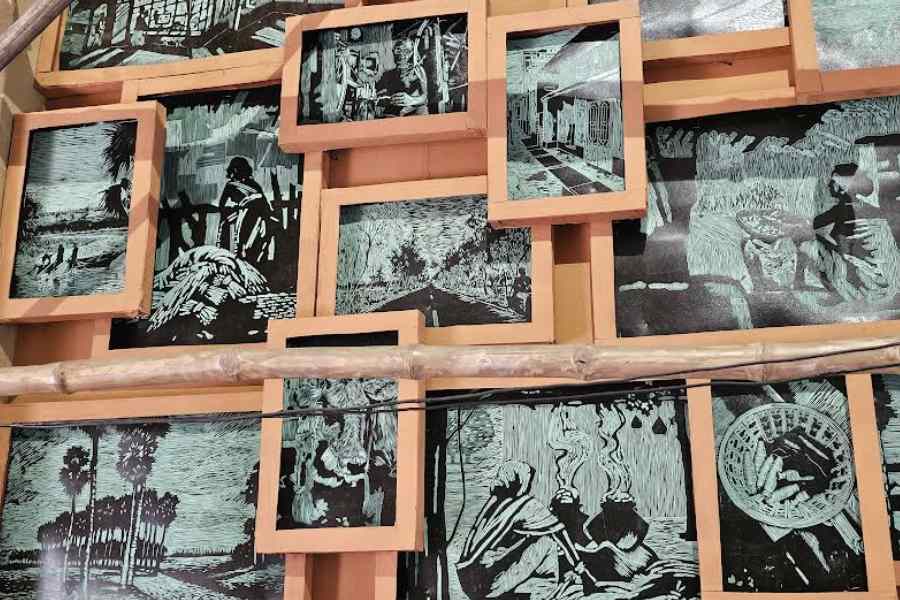
Dum Dum Park Bharat Chakra Sudeshna Banerjee
Dum Dum Park Sarbojanin
Year: 73rd
Budget: Rs 15 lakh
Theme: Manabjomin
Theme-maker: Debatosh Kar
The look: Dried brinjal bushes have been put to striking use, hanging from the roof of the pandal in a cluster. They compliment the paintings on the walls of the pandal where roots aspire towards life and hands stretch towards a blue sky. “In a world where people quarrel if leaves from a tree in the neighbour’s house fall in their compound, I see the world as a dry leafless place. When we go out of town, we marvel at the green landscape. But our greenery is withering as we do not care for nature,” says Kar, who has filled the pandal walls with canvases of upside-down trees whose roots reach skyward.
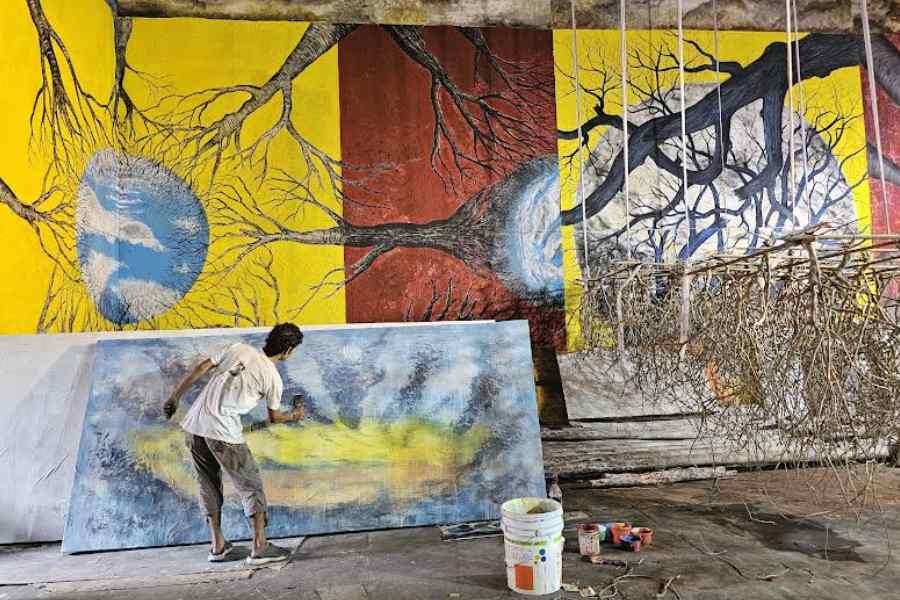
Dum Dum Park Sarbojanin Sudeshna Banerjee
Dum Dum Tarun Dal
Year: 47th
Budget: Rs 70 lakh
Theme: Sada ar Neel
Theme-maker: Pradip Das
The look: The pandal demonstrates British colonial exploitation of Bengal through the thread of two kinds of crops — futi kapas, that is used to produce white muslin, and indigo, the plant from which blue dye is extracted for clothes. One enters through a tunnel with illustrations on the pages of wooden replicas of open books, based on Dinabandhu Mitra’s play Neeldarpan on the atrocities inflicted by indigo planters on farmers on one side. On the other side are portraits of well-known figures in history, like Josephine, the wife of Emperor Napoleon, or Noor Jahan, the wife of Emperor Jahangir, portrayed wearing muslin. Stages of indigo production are also shown through actual clothes dyed with indigo as well as replicas of paintings of indigo planters by a European photographer. An indigo plant will also be planted inside the pandal complex. Impressions of uniforms of British Raj soldiers hang on display inside. A huge statue of Queen Victoria stands in full regalia. Far above on a wall are scenes of British officers interacting with local people, painted in a blaze of blue. Under a shade, a weaver would sit to demonstrate handloom weaving live. The goddess, further up, is imposing and in an electric blue sari. Behind her to a side, is a fleet of East India Company, as waterways are how muslin would be exported and indigo planters came to India.
Baguiati-Kestopur area
Kestopur Prafullakanan
Year: 22nd
Budget: Rs 25 lakh
Theme: Ekanno
Theme-maker: Rupchand Kundu
The look: Kundu had put discarded concrete pile caps used for Metro work to create masked men in a traffic island near Mangaldeep in New Town to commemorate the pandemic period of masks. Now he is decorating the pandal with the same material. “I am interpreting ekanno as a number. There are 50 such concrete female figures. The 51st is the goddess herself. I want to create a feel of ancient spirituality here,” he said. The pandal is a work of cement and concrete. While many of the figures have faces like tribal masks, the engravings on the walls and the towering pillars in front of the goddess remind create a vibe of an ancient civilisation. The goddess is in the aspect of Annapurna, with a handi of grains in one hand in place of the trident and another raised in benediction. The eight other hands hold weapons.
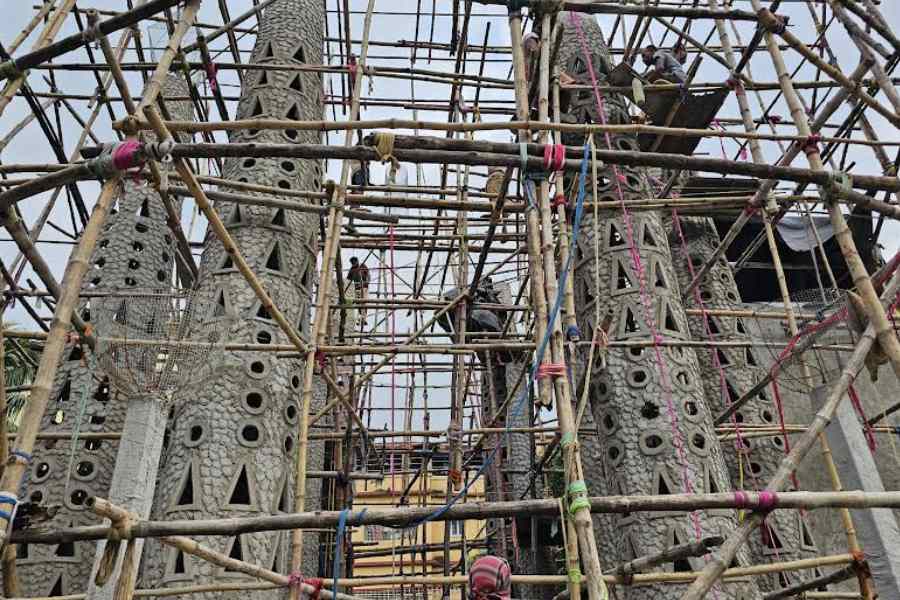
Kestopur Prafullakanan Sudeshna Banerjee
Dakshinpara
Year: 64th
Budget: Rs 60 lakh
Theme: Taranga
Theme-maker: Debashis Barui
The look: “I interpret taranga as layers, not waves. All the structures end in a pointed shape, denoting infinity,” said Barui. There is a lot of movement in the pandal — the wings of birds in flight hanging from the ceiling, shapes on the walls… A rusted look abounds, which has been created by pasting rust-coloured nets on sunboard. The idol is three-dimensional and visitors will have to reach in front after walking in a circle behind her. She is in an unusual pose, looking sideways and her face can be seen even before one reaches in front. Flickering lamps on the inner boundary create an aura of mystery.
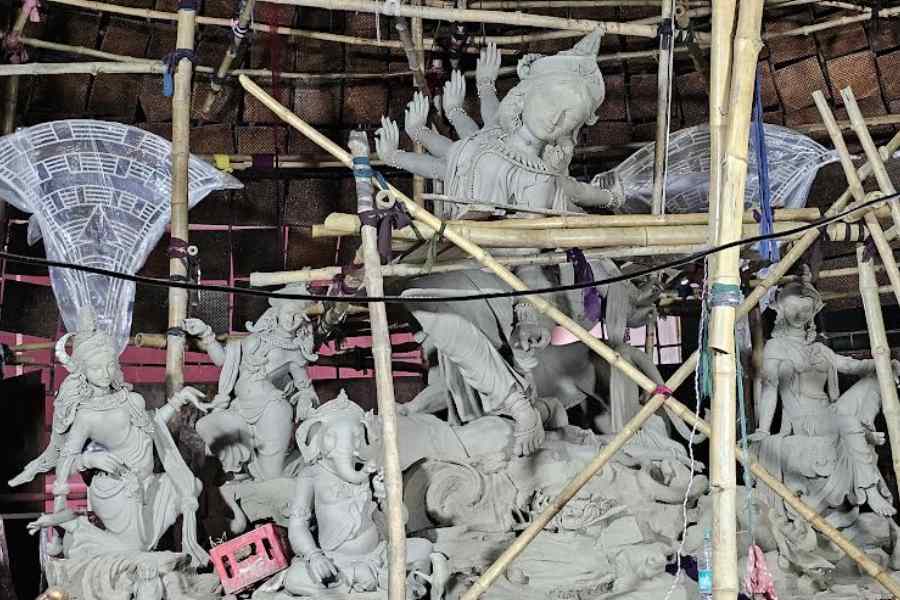
Dakshinpara Sourced by The Telegraph
Ashwininagar Bandhumahal
Year: 44th
Budget: Rs 37 lakh
Theme: Baro yari
Theme-maker: Samrat Bhattacharya
The look: A 32ft crown stands at the entrance as an elaborate arched portal. The pandal tells the story of the first puja by and for the public, sponsored by 12 friends in Guptipara, Hooghly. “We will start with zamindari pujas which were a display of splendour, sometimes in the presence of British sahibs. From there we will share the story of denial of admission to common people in Guptipara, triggering the breakaway bid,” said Bhattacharya. Under a canopy will stand an 18ft figure of a Mother Goddess which will be a blend of Jagaddhatri, Kali and Durga. “This represents Puja coming out of household courtyards into the open streets,” he added. Further up is the sanctum sanctorum where a traditional clay idol will be worshipped.
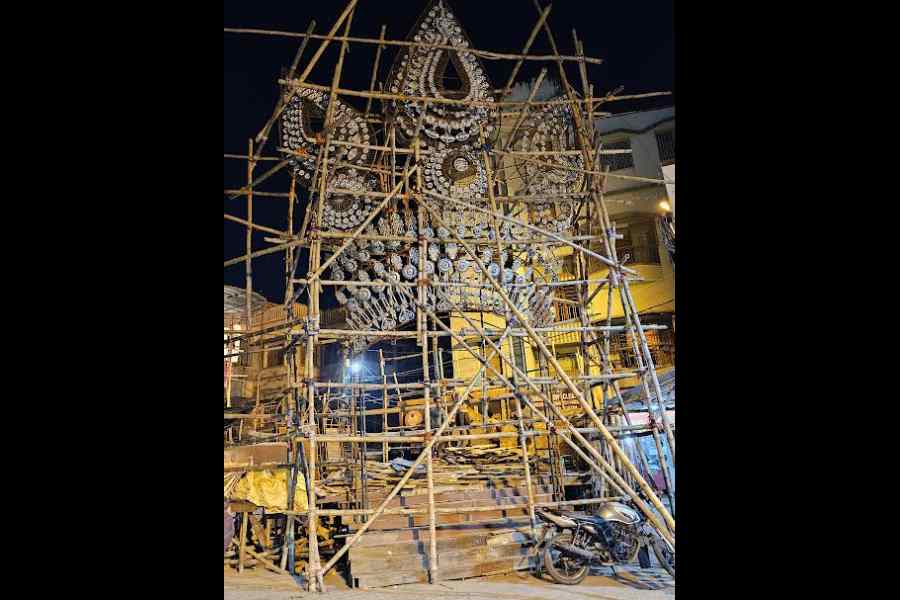
Ashwininagar Bandhumahal Sudeshna Banerjee
Lake Town area
Lake Town Adhibasibrinda
Year: 62nd
Budget: Rs 20 lakh
Theme: Ora na Amra
Theme-maker: Subal Pal
The look: It is a puja performed by tribals. So the main materials are sal leaves and the natural trees in the park. Flames burn at the entry to the sanctum sanctorum. Subal Pal’s idol will be traditional.
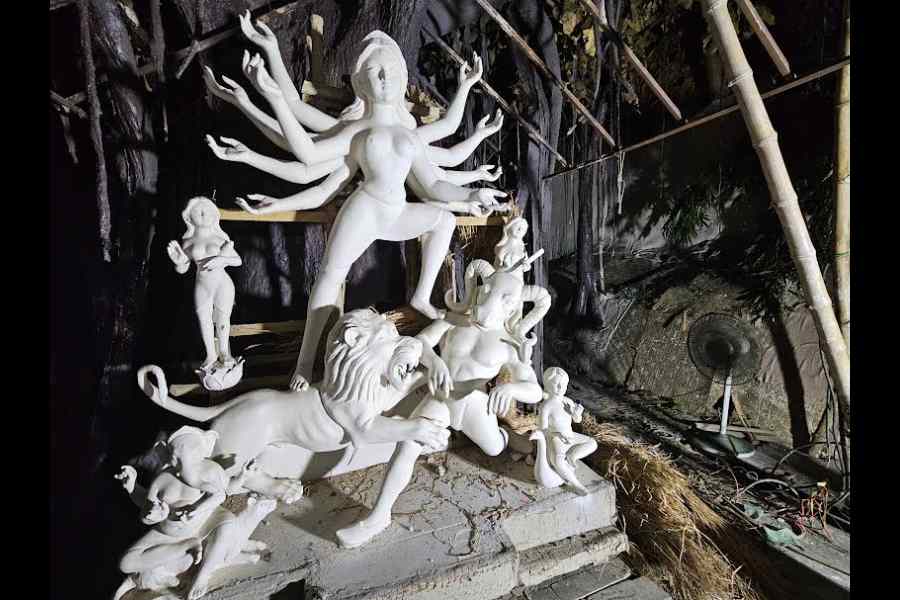
Lake Town Adhibasibrinda Sudeshna Banerjee
Sreebhumi
Year: 52nd
Budget: Undisclosed
Theme: Tirupati temple
Theme-maker: Romio Hazra
The look: The crowd-puller puja is presenting a 115 ft temple that will glisten with the texture of pearls. “A total of 150 fibre statues are being created of Garuda, Laxmi, Narayan and the like, most of which will be placed atop, at various levels of the gopuram,” said Romio Hazra, who is in charge of the pandal. The interiors are dazzlingly golden, with six stlised lion shapes standing sentry. The approach will be lit up with lights from Chandernagore. The traditional idol will be adorned with gold jewellery.
Dakshindari Youths
Year: 28th
Budget: Rs lakh
Theme: Singhabahini
Theme-maker: Anirban Das
The look: The pandal that covers an enormous field is a tribute to the filmmaker Tapan Sinha in his centenary year. Visitors enter through a wing-like metal structure on which Sinha’s films will be projected in hologram at night. A huge wheelchair stands at a side, reminding one of his film starring Saumitra Chatterjee. An oversized harmonium stands under a gazebo, once again in a nod to the eponymous film. The shell of a taxi stands as a symbol of his Calcutta trilogy. An installation has been created with posters of 27 of his best-known films. Cutouts of key figures from films like Banchharamer Bagan, Adalat O Ekti Meye, Jhinder Bandi etc line the ground level of the walls which have portraits of actors who acted under his baton. The pandal is the head of an elephant, in tribute to his award-winning 1978 film Safed Haathi. Premendu Bikash Chaki’s light adds a serene touch to this tribute.
Ultadanga area
Ultadanga Bidhan Sangha
Year: 56th
Budget: Rs 40 lakh
Theme: Banijye Basate Laxmi
Theme-maker: Moloy-Subhamoy
The look: A port city is coming up ahead of Gouriberia bridge on the same side as Bidhannagar Road station. A 65 ft boat is the centerpiece of the pandal which visitors have to cross to reach the goddess. “Boatmakers from Basirhat built the boat under the guidance of researcher Swarup Bhattacharya. It is modeled on the betnai boats that used to ferry goods,” says club member Arup Das. Durga blows a conch shell, as if to give a clarion call to her devotees to return to the world of business, which Bengalis have receded from. She sits on a boat which used to set sail carrying ware of merchants like Chand Saudagar of the Manasamangal fable. With her are seated Saraswati and Kartick while Laxmi and Ganesh, made of fibre glass, sit on a kulo in her hand. On the way out, visitors pass by city shops like grocery, tea shops, trading posts etc.
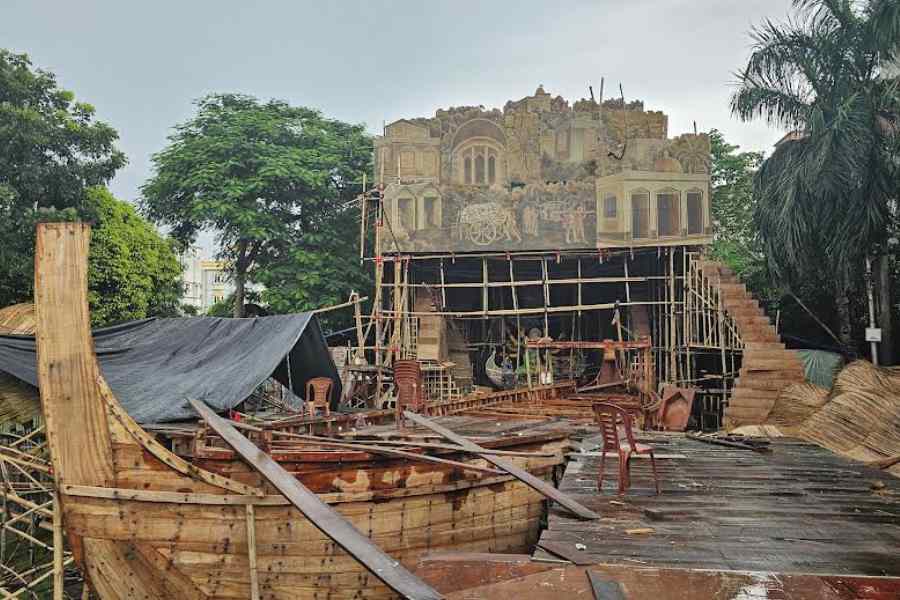
Ultadanga Bidhan Sangha Sudeshna Banerjee
Telengabagan
Year: 59th
Budget: Rs 35 lakh
Theme: Prithibi godyomoy
Theme-maker: Parimal Pal
The look: At the entrance, a contraption makes rotis and visitors walk in under a sculptures of a procession of the hungry. Empty plates with an outstretched hand painted on each dot the walls of the approach. Inside, a giant empty plate carries the words of Sukanta Bhattacharya’s poem around installations of wasted food. In the middle hangs a giant tandoor, inside which will revolve a huge chunk of meat, supplying food to a hanging restaurant, replete with chairs, tables and even a refrigerator. The goddess is Annapurna, a village mother on whose lap little Ganesha plays, to whom the procession of the hungry tooks to for succour.
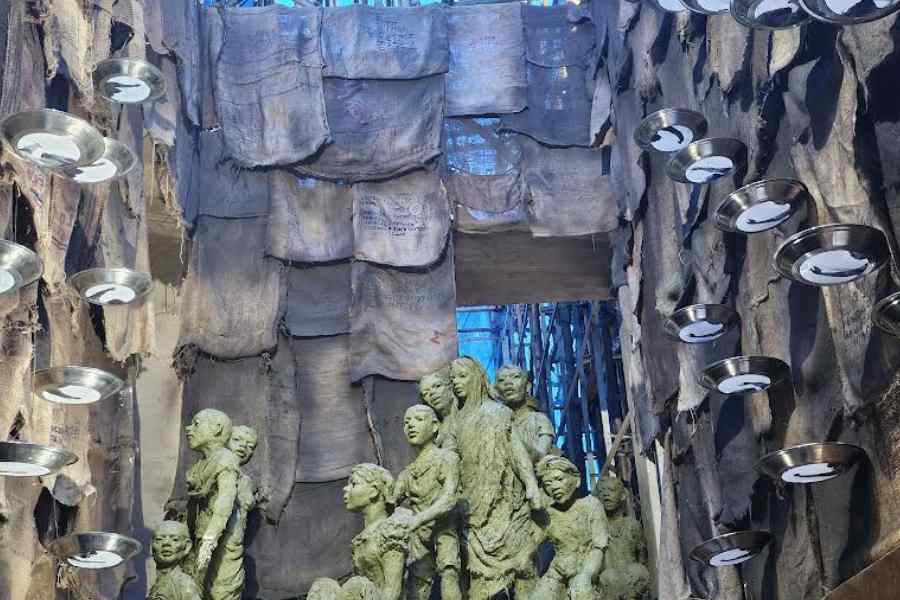
Telengabagan Sudeshna Banerjee
Beleghata-Kankurgachhi area
Kankurgachhi Yubak Brinda
Year: 95th
Budget: Rs 30 lakh
Theme: Rupokar
The look: The pandal is a tribute to the tailor who robes the unrobed body. Various equipment from the tailor’s trade adorn the pandal. Oversized iron, hangers, reels of threads, scissors dot the space. A 13ft sewing machine, in which the needle goes up and down, holds pride of place. “While puja is synonymous with new clothes, many underprivileged families cannot afford to buy clothes for their children. The club will donate clothes to 100 such kids. The children’s clothes used in the pandal too will later be donated,” said Santra. The goddess, by Piyali Sadhukhan, will have embroidered pieces of cloth pasted on her. Behind her is a gigantic face of Shiva, created out of cloth.
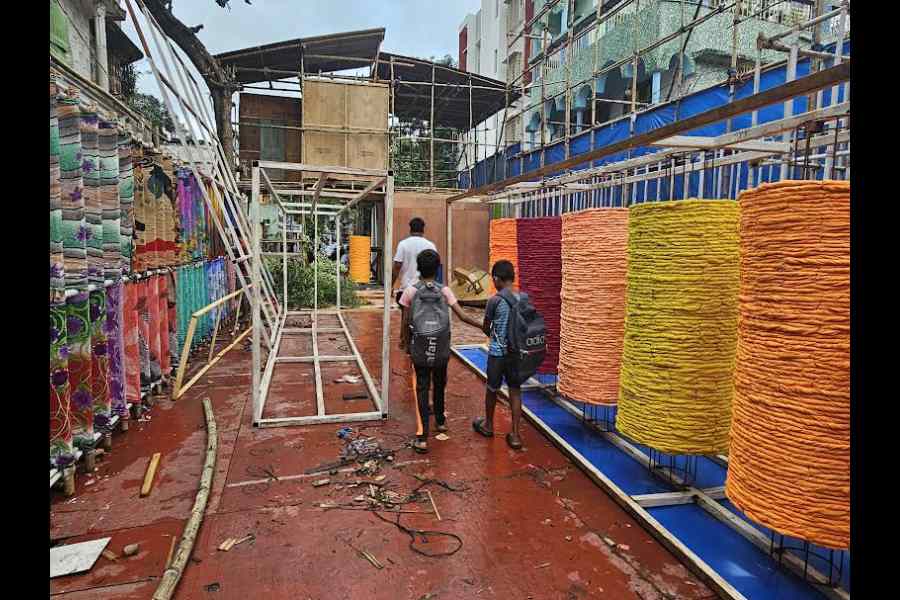
Kankurgachhi Yubak Brinda Sudeshna Banerjee
Mitali
Year: 88th
Budget: Rs 22 lakh
Theme: Upashona
Theme-maker: Prasanta Pal
The look: “Increasingly pujas are moving away from the primacy of the idol and calling this art. I want to shift the focus back to the goddess,” said Prasanta Pal. The entire pandal is chock-a-block with various aspects of the Mother Goddess. The feel is of an old pithasthan in a village, resonating with devotion. Some are etched on walls, while others are placed on pedestals. The artist intends to leave them with a clay finish. The only elements of colour are in the use of shakha-pola, clay soras with faces of the goddess and sindur.
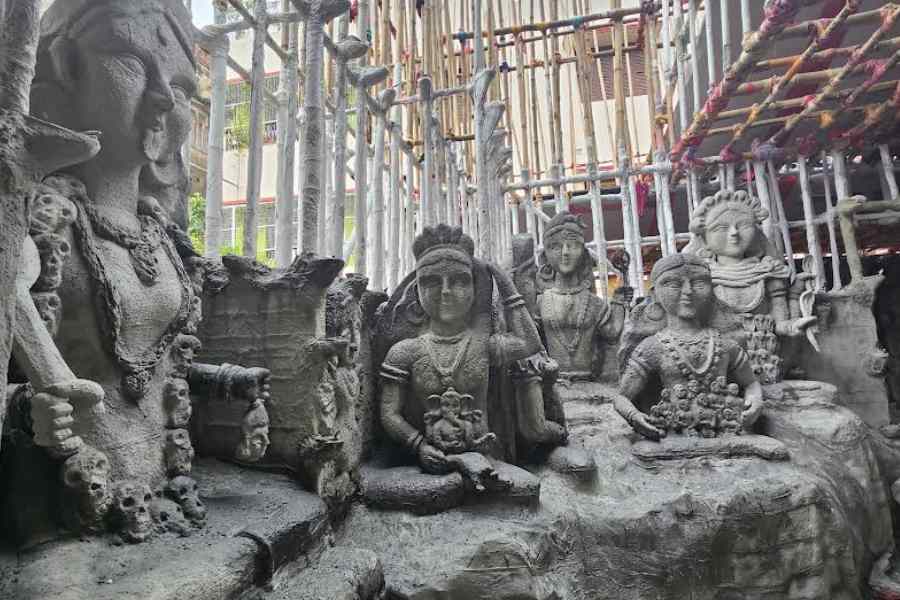
Mitali, Kankurgachi Sudeshna Banerjee
Beliaghata 33 Palli
Year: 24th
Budget: Rs 25 lakh
Theme: Kohinoor
Theme-maker: Samrat Bhattacharya
The look: The pandal traces the journey of the world’s most celebrated diamond. A ship stands at the entrance as the diamond had set sail from Indian soil for the British isles in a ship. A 25 ft peacock throne, at a side of which the diamond once shone, and which was used in the golden age of the Mughal Empire, welcomes the visitor. At one side, is a huge sketch of Queen Victoria whose crown jewel the diamond became. An imaginary page from a British newspaper announces the arrival of the gemstone surrendered to the Crown. The story then rewinds backwards. There are equally large portraits of other key players in the story like the plundering Nadir Shah of Iran and the king of Punjab Ranjit Singh who owned the diamond at various stages of history and smaller framed portraits of other rulers who were connected to the diamond. The beautiful portraits in black on wood on the walls lends the whole pandal a sepia look. The story leads back to the coal mine from where the diamond was extracted. This is where the goddess is etched in relief, with an artificial diamond cut in the same size and shape set at the centre of the idol’s chest.
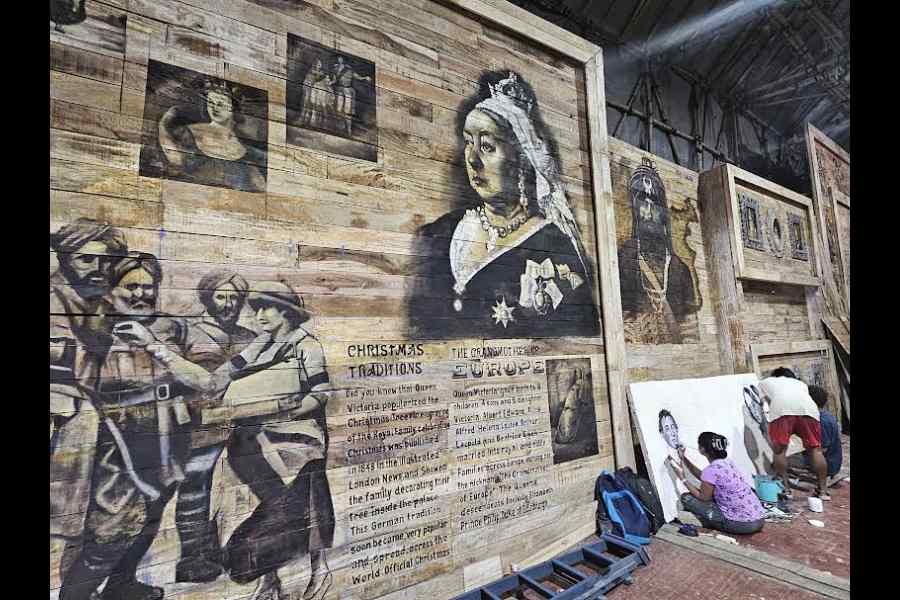
Beliaghata 33 Palli Sudeshna Banerjee
Sandhani
Year: 55th
Budget: Rs 50 lakh
Theme: Platform 1/3
Theme-maker: Somnath Dalui
The look: It is a surreal world that the artist has created. A steam engine stands out of which the driver, a giraffe, puts its neck out. Railway tickets which used to get punched before booking counters were computerised dot the walls. Ticket counters and STD booths stand at various corners. An astronaut sits on the platform while giant snails climb the stairs. The goddess stands tall amid this imaginary rail station.
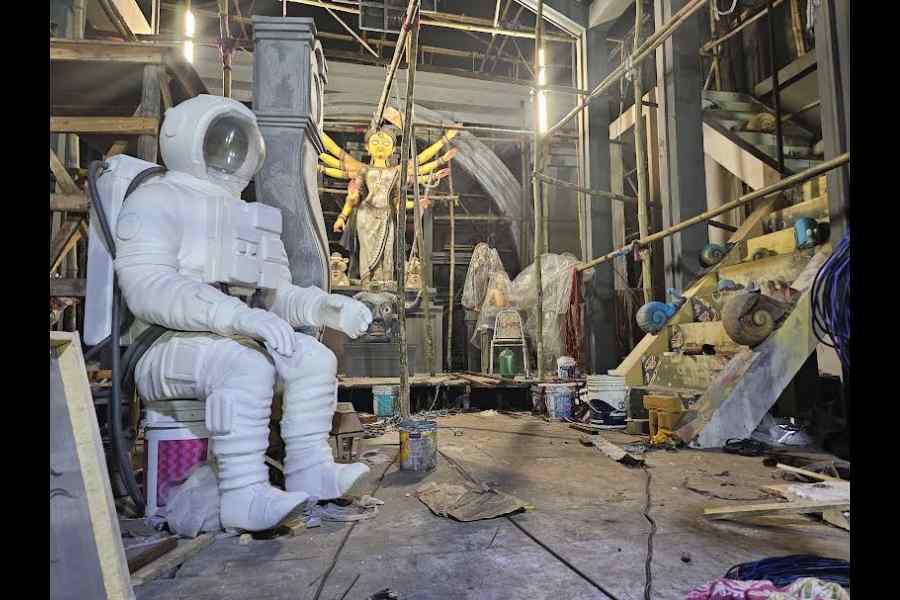
Sandhani, Beleghata Sudeshna Banerjee

